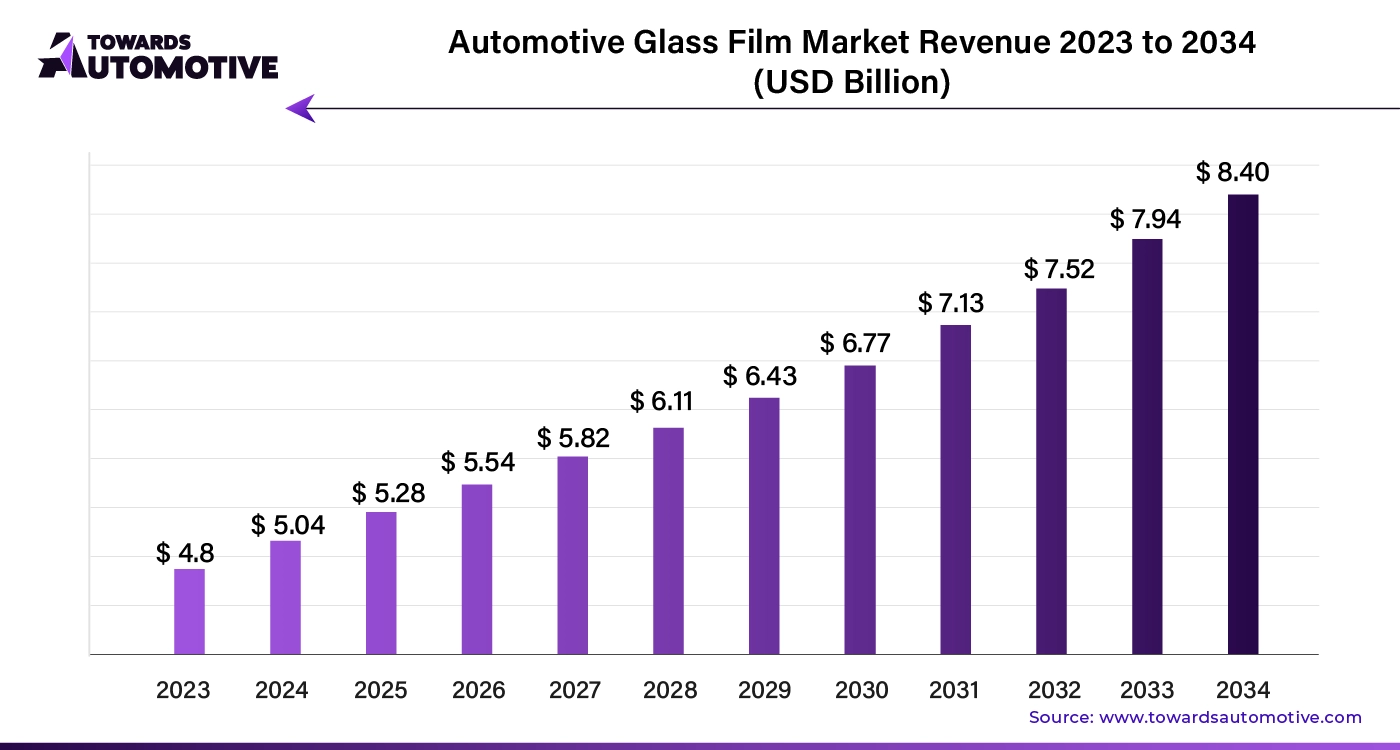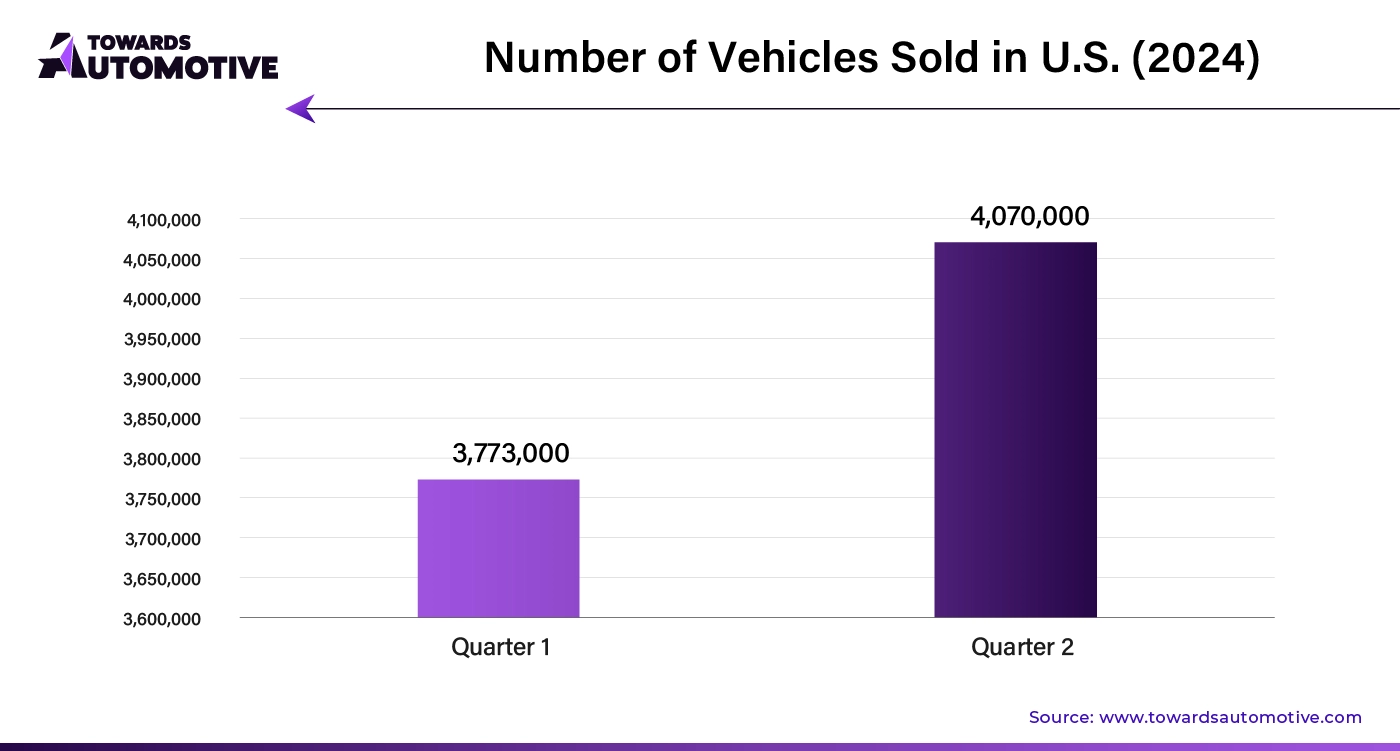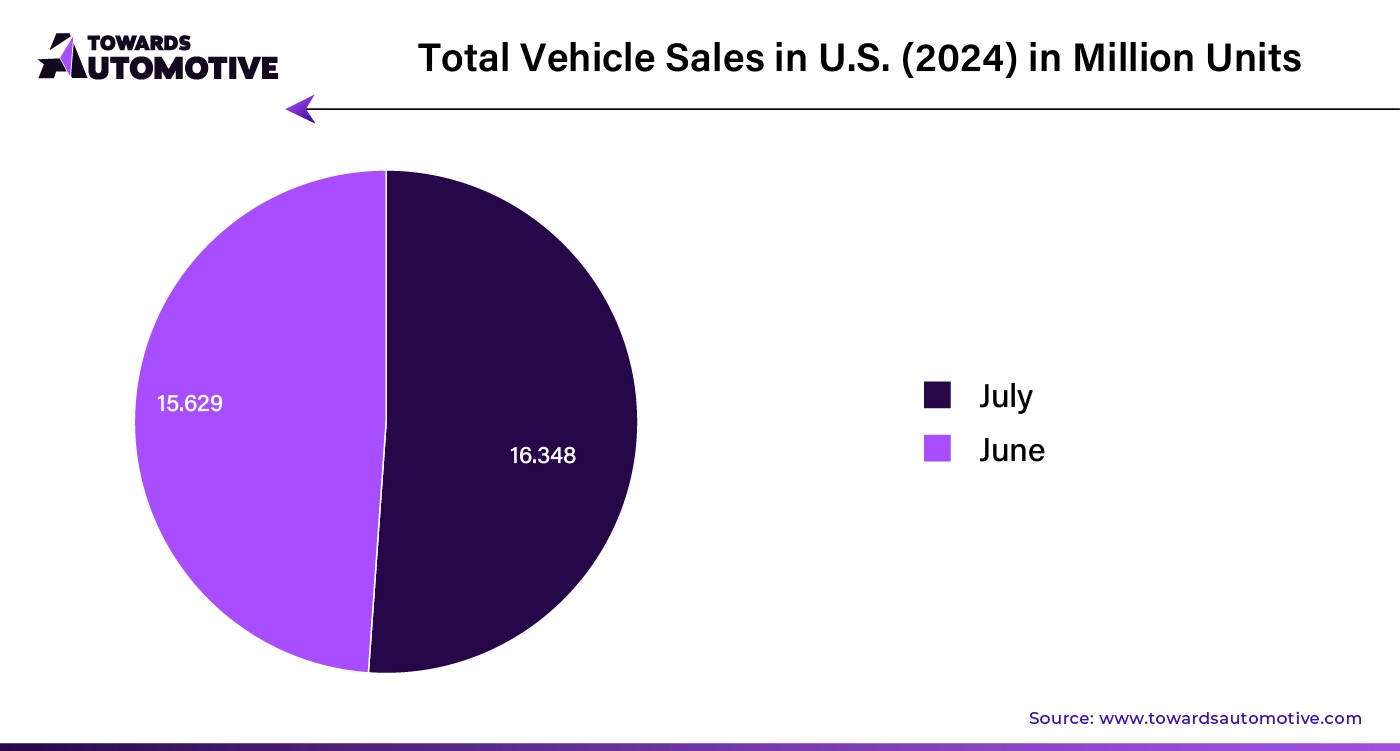April 2025
The global automotive glass film market size is calculated at USD 5.04 billion in 2024 and is expected to reach around USD 8.40 billion by 2034, growing at a CAGR of 4.9% from 2024 to 2034.

Unlock Infinite Advantages: Subscribe to Annual Membership
The automotive glass film market is experiencing significant growth as advancements in film technology and increasing consumer demand for vehicle aesthetics and protection drive its expansion. Automotive glass films, which include window tints, protective coatings, and heat-insulating films, are becoming essential components for modern vehicles. These films enhance the driving experience by offering benefits such as improved privacy, UV protection, and reduced heat and glare. They also contribute to vehicle safety by increasing shatter resistance and reducing the risk of glass-related injuries in the event of an accident. As environmental regulations and energy efficiency standards become more stringent, automotive glass films provide a practical solution for improving fuel efficiency and interior comfort. The market is further fueled by innovations in film technology, which offer enhanced durability, clarity, and ease of application. With growing awareness of the benefits of automotive glass films and increasing vehicle customization trends, the market is set for continued expansion, driven by both technological advancements and evolving consumer preferences.
AI is transforming the automotive glass film market by enhancing both product development and customer experience. Advanced AI algorithms enable manufacturers to design smarter, more effective glass films through predictive analytics and simulations, optimizing factors like durability, heat insulation, and UV protection. AI-driven data analysis helps identify emerging trends and consumer preferences, allowing companies to tailor their products more precisely to market needs.
In addition, AI facilitates automated production processes, improving the efficiency and precision of film application and reducing costs. Smart technologies, such as AI-powered sensors, are being integrated into automotive glass films to monitor and adjust properties like tint level and heat insulation in real-time, enhancing functionality and user experience. As AI continues to evolve, it supports innovation in film technology, driving advancements that meet regulatory standards and consumer demands, ultimately shaping the future of the automotive glass film market.
The rising production and sales of vehicles are significantly driving the growth of the automotive glass film market. As the automotive industry experiences robust expansion, more vehicles on the road create increased demand for automotive glass films. These films, which offer benefits such as UV protection, heat insulation, and enhanced privacy, are becoming essential components for new vehicles. The growing vehicle fleet is prompting manufacturers to innovate and offer a diverse range of glass films that cater to varying customer preferences and regulatory requirements.
Additionally, the surge in vehicle sales has led to a greater emphasis on vehicle customization and aesthetics, with consumers seeking advanced glass films that enhance both functionality and style. The expansion of global automotive markets, particularly in emerging economies, further fuels this demand, as increasing disposable incomes enable more consumers to invest in aftermarket enhancements. As vehicle production and sales continue to rise, the automotive glass film market is set to grow, driven by both the need for improved vehicle performance and consumer desire for personalized and protective features.

The automotive glass film market faces numerous restraints such as high production costs and complex regulatory requirements. Premium films often come with substantial price tags, which can deter cost-sensitive consumers. Additionally, varying regional regulations and standards for automotive glass films complicate compliance and increase market entry barriers. These factors can limit market growth and slow the adoption of advanced glass film technologies.
Eco-friendly glass is creating significant opportunities for the automotive glass film market by aligning with the growing demand for sustainable and environmentally responsible products. As consumers and regulators increasingly prioritize eco-friendly solutions, automotive manufacturers are seeking glass films made from sustainable materials or those that improve energy efficiency. Eco-friendly glass films, which often use recycled or less harmful raw materials, meet these demands while offering similar performance benefits as traditional films, such as UV protection and heat insulation.
The shift towards eco-friendly products is driven by both consumer preferences and regulatory pressures for reduced environmental impact. Manufacturers are innovating to develop glass films that not only enhance vehicle performance but also contribute to sustainability goals. For instance, films that improve the energy efficiency of vehicles by reducing the need for air conditioning and heating can help lower overall carbon emissions. This alignment with sustainability trends provides growth opportunities for companies that offer green solutions, as they can attract environmentally conscious consumers and comply with increasingly stringent environmental regulations. As the market continues to evolve, the focus on eco-friendly glass will play a crucial role in shaping the future of automotive glass films.
The ceramic films segment is expected to grow with a CAGR of 4.7% during the forecast period. Ceramic films are driving significant growth in the automotive glass film market due to their unique properties and performance benefits. Unlike traditional films, ceramic films provide superior heat rejection and UV protection without compromising visibility. This makes them increasingly popular among consumers who seek enhanced comfort and protection from harmful sun exposure while driving. The ability of ceramic films to block infrared radiation helps maintain a cooler interior, reducing the reliance on air conditioning and ultimately improving fuel efficiency.
Additionally, ceramic films are highly durable and resistant to scratches, ensuring that they maintain their appearance and effectiveness over time. This longevity appeals to consumers looking for long-term investments in vehicle enhancements. As the demand for high-performance window films grows, manufacturers are focusing on developing advanced ceramic technologies that offer better clarity, customization options, and ease of installation.
Furthermore, the increasing awareness of the benefits of ceramic films, coupled with a growing trend toward vehicle personalization, is propelling their adoption. As consumers prioritize quality and performance in their vehicle enhancements, ceramic films are poised to become a leading choice, significantly contributing to the overall growth of the automotive glass film market.
The windshield segment is anticipated to grow with a CAGR of 4.6% during the forecast period. This segment significantly drives the growth of the automotive glass film market by highlighting the essential role of advanced films in enhancing vehicle safety and comfort. Windshields, being a critical component of a vehicle's glass system, benefit greatly from high-quality automotive films that provide increased UV protection, reduce glare, and improve overall visibility. Films applied to windshields help protect occupants from harmful UV rays, which can lead to skin damage and interior fading. Additionally, these films contribute to heat rejection, maintaining a more comfortable cabin temperature and reducing the strain on air conditioning systems.
The demand for windshield films is rising as consumers and manufacturers focus on improving driving safety and comfort. Innovations such as advanced multi-layer films offer enhanced durability and optical clarity, further driving their adoption. As vehicle manufacturers increasingly integrate these technologies into their designs, and as regulations and consumer preferences for enhanced vehicle safety and comfort evolve, the growth of the automotive glass film market continues to be strongly influenced by advancements in windshield film technology.
United States is expected to grow with a CAGR of 3.47% during the forecast period. In the USA, several key factors are fueling the growth of the automotive glass film market. Firstly, the increasing consumer awareness of the benefits of automotive glass films, such as UV protection, heat reduction, and enhanced privacy, drives demand for these products. Consumers are seeking advanced films that offer improved comfort and protection, leading to higher adoption rates. Additionally, stringent regulations aimed at reducing vehicle emissions and enhancing energy efficiency support the use of films that contribute to lower cabin temperatures and reduced reliance on air conditioning.
Technological advancements in film materials, including innovations in clarity, durability, and ease of application, further stimulate market growth. The rise in vehicle customization trends also plays a significant role, as consumers look to personalize their vehicles with high-quality, aesthetically pleasing films. Furthermore, the expansion of the automotive sector and increasing vehicle production in the USA provide a robust market for automotive glass films. As manufacturers continue to innovate and meet evolving consumer needs, the automotive glass film market in the USA is set to experience sustained growth and expansion.

United Kingdom is predicted to grow at a CAGR of 3.4% during the forecast period. The growing consumer awareness about the benefits of automotive glass films, such as enhanced UV protection, heat reduction, and increased privacy, fuels demand for these products. Additionally, stringent environmental regulations and a strong emphasis on energy efficiency encourage the adoption of films that improve cabin comfort and reduce energy consumption.
The rising trend of vehicle customization and a focus on premium features also contribute to market expansion, as consumers seek high-quality glass films that offer both functional and aesthetic enhancements. Moreover, advancements in film technology, including improved durability and clarity, align with the UK’s demand for innovative and reliable vehicle accessories. As manufacturers continue to innovate and respond to evolving consumer preferences, the automotive glass film market in the UK is poised for continued growth, supported by a combination of regulatory pressures and a dynamic consumer landscape.
Germany is anticipated to grow with a CAGR of 3% during the forecast period. The increasing consumer demand for advanced vehicle features, including high-performance glass films that provide superior UV protection, heat reduction, and enhanced privacy, significantly contributes to market expansion. Germany’s stringent environmental regulations also play a crucial role, as they promote the adoption of energy-efficient solutions like glass films that improve cabin comfort and reduce reliance on air conditioning.
The strong focus on technological innovation and vehicle customization further drives market growth, with consumers seeking premium films that enhance both functionality and aesthetics. Additionally, Germany's robust automotive industry and high vehicle production rates create a steady demand for automotive glass films. As manufacturers continue to advance film technology and cater to evolving consumer preferences, the automotive glass film market in Germany is set for sustained expansion, supported by a combination of regulatory incentives and a dynamic automotive sector.
China is assumed to grow with a CAGR of 4.57% during the forecast period. The rapid expansion of the automotive industry, with increasing vehicle production and sales, creates a rising demand for automotive glass films. Chinese consumers are increasingly seeking advanced films that offer superior UV protection, heat insulation, and privacy, boosting market growth.
Additionally, the government’s stringent environmental regulations and initiatives promoting energy efficiency encourage the adoption of glass films that enhance vehicle performance and comfort. The emphasis on vehicle customization and premium features also contributes to the market’s expansion, as consumers look for high-quality films that provide both functional benefits and aesthetic appeal.
Moreover, technological advancements in film materials, such as improved durability and clarity, align with the growing expectations for innovative vehicle accessories. As manufacturers continue to innovate and address evolving consumer needs, the automotive glass film market in China is set for continued growth, supported by a dynamic automotive sector and regulatory support.
Japan is likely to grow with a CAGR of 5% during the forecast period. The country’s strong emphasis on technological innovation and consumer demand for high-quality automotive accessories are central to this growth. Japanese consumers increasingly value automotive glass films that offer superior UV protection, heat rejection, and enhanced privacy, leading to higher adoption rates.
Additionally, Japan’s strict environmental regulations and commitment to energy efficiency propel the demand for films that help reduce interior temperatures and lower energy consumption. The rapid advancements in automotive technology and the increasing production of vehicles equipped with advanced features also contribute to the market’s growth.
The Japanese automotive industry’s focus on vehicle customization and premium enhancements further boosts the demand for advanced glass films that offer both functional and aesthetic benefits. As manufacturers continue to develop cutting-edge film technologies and address the evolving needs of Japanese consumers, the automotive glass film market in Japan is set to experience sustained expansion. The combination of technological innovation, regulatory support, and consumer preferences ensures a dynamic and growing market landscape.
South Korea is projected to grow with a CAGR of 5.8% during the forecast period. The country’s focus on technological innovation and high consumer demand for advanced vehicle features contribute significantly to market expansion. South Korean consumers increasingly seek automotive glass films that offer enhanced UV protection, heat insulation, and improved privacy, aligning with their preferences for premium vehicle accessories.
Additionally, stringent environmental regulations and a push for energy-efficient solutions are fueling demand for glass films that reduce interior heat and improve fuel efficiency. The rapid growth of the automotive industry in South Korea, characterized by increasing vehicle production and sales, further supports the market. The emphasis on vehicle customization and aesthetic enhancements also drives interest in high-quality glass films, which offer both functional and visual benefits.
As manufacturers continue to innovate with new film technologies and address evolving consumer needs, the South Korean automotive glass film market is poised for sustained growth. The combination of technological advancements, regulatory support, and consumer preferences ensures a robust and expanding market landscape.
By Film Type
By Application
By Region
April 2025
April 2025
April 2025
April 2025
We offer automotive expertise for market projections and customizable research, adaptable to diverse strategic approaches.
Contact Us